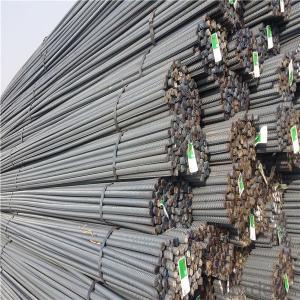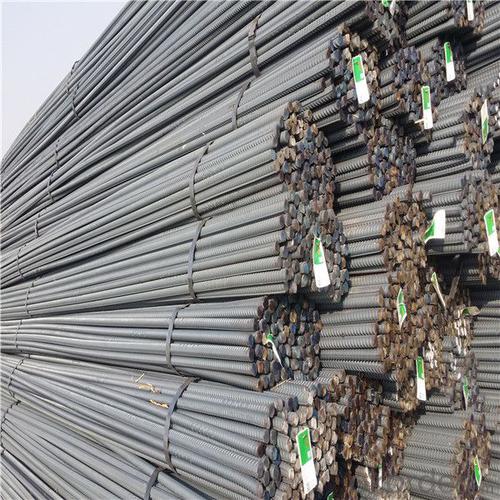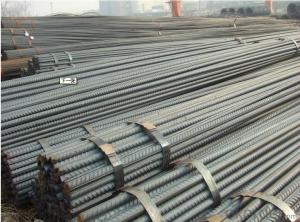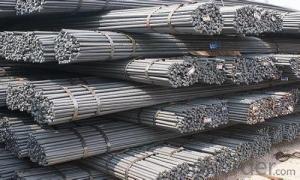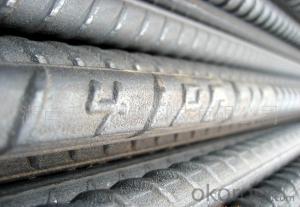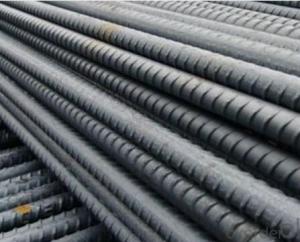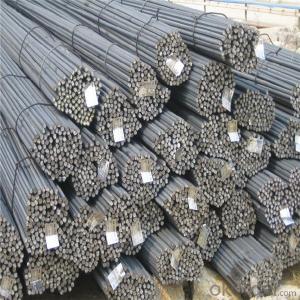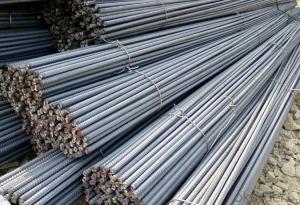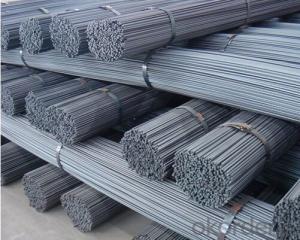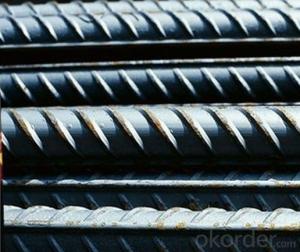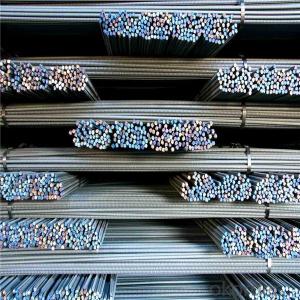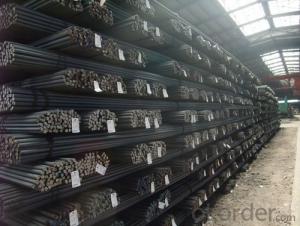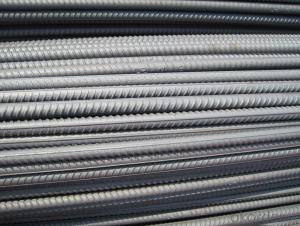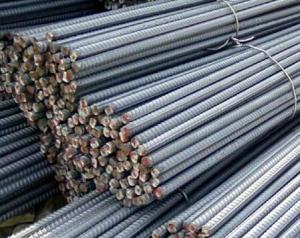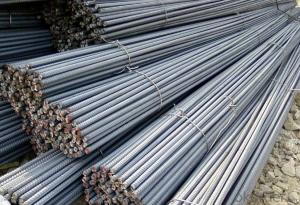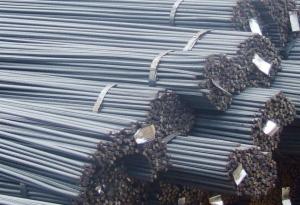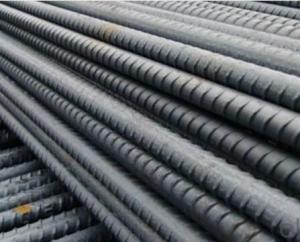Chinese manufacturer steel rebar high quality
- Loading Port:
- China main port
- Payment Terms:
- TT OR LC
- Min Order Qty:
- 1000 m.t.
- Supply Capability:
- 19865 m.t./month
OKorder Service Pledge
OKorder Financial Service
You Might Also Like
Specification
Although rebar has ridges that bind it mechanically to the concrete with friction, it can still be pulled out of the
concrete under high stresses, an occurrence that often precedes a larger-scale collapse of the structure. To prevent
such a failure, rebar is either deeply embedded into adjacent structural members, or bent and hooked at the ends to
lock it around the concrete and other rebars. This first approach increases the friction locking the bar into place while
the second makes use of the high compressive strength of concrete
Most grades of steel used in rebar cannot accept welding; such as, to adjacent steel plates or as means to
bind single pieces of rebar together. However, special grades of rebar steel and welding rods make welding
by expert welders possible.
Our Advantage:
High quality steel products from 1 class mills in China
Reasonable price
Professionalism of the products
On-time delivery
Complete documents and certificates
Sincere service to meet our clients' requirements
Product Description :
Chemical composition (%): | Steel | C | Si | Mn | P | S | Ceq | ||||
HRB335 |
0.25 |
0.80 |
1.60 |
0.045 |
0.045 | 0.52 | |||||
HRB400 | 0.54 | ||||||||||
HRB500 | 0.55 | ||||||||||
Mechanical properties | Steel | Rel/ MPa | Rm/ MPa | A/ % | Agt/ % | ||||||
≥ | |||||||||||
HRB335 | 335 | 455 | 17 |
7.5 | |||||||
HRB400 | 400 | 540 | 16 | ||||||||
HRB500 | 500 | 630 | 15 | ||||||||
Package: | Standard export packing or as customer's request | ||||||||||
Application: | Construction, building, bridge, road. ect | ||||||||||
Payment terms | 1).100% irrevocable L/C at sight. | ||||||||||
Delivery time | 15-30 days after receipt of L/C or deposit by T/T | ||||||||||
Features
1、Pure steel quality, stable chemical contents, small tolerance.
2、Constant Quality, good drawing performance.
3、High dimension accuracy degree, accuracy degree of Level C up to 80%, smooth surface, less scale, easy to be pickled.
4、Automatic bundling with 4 lines by Machine in tidy and good looks
5、Big high quality percentage, small coil percentage, and heavy coil weight for Hard Coil.
6、High sorbitizing percentage.
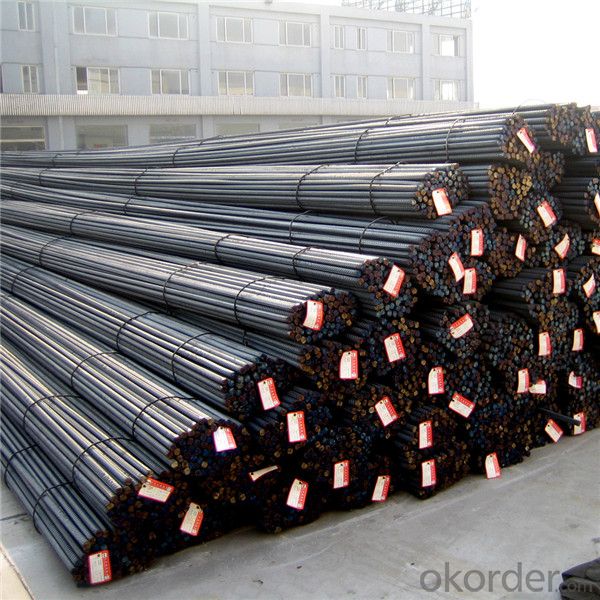
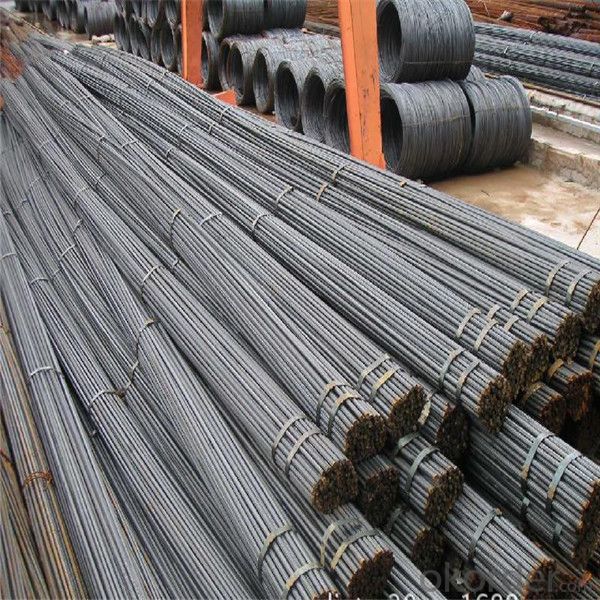
Packing:
In bundles, each bundle weight 3.5 tons. Load by container or by bulk verssel.
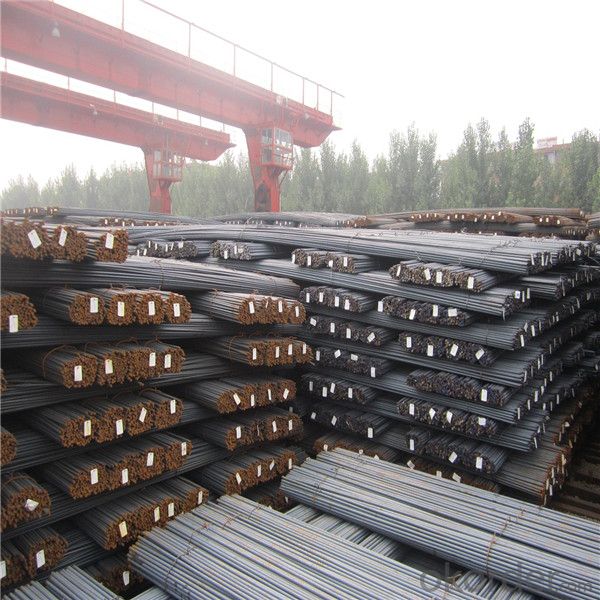
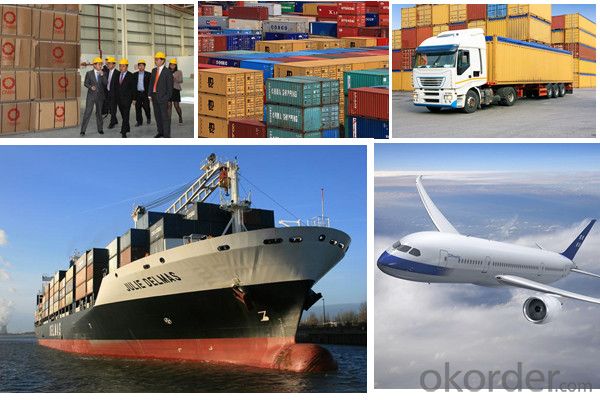
Our service
(1) We cooperate with famous factories with advanced equipment and well trained workers.
(2) We can provide factory price with trading company service.
(3) We continuously work on the improvement of our processes, guaranteeing consistently high standards
of quality to keep none compensation.
(4) We guarantee 24 hours response and 48 hours solution providing service.
(5) We accept small order quantity before formal cooperation.
(6) We deliver the agreed quality at the agreed time, reacting to changes in customer wishes in a flexible way.
(7) Due to our volume and selling power, we have excellent freight rates with shipping lines.
(8) We strive to always be fair and honest in our dealings with customers.
(9) We strive to work together with customers to achieve much more than we can achieve alone.
(10) Through our passion and commitment we aim to be a market leader in all our key markets. To maintain
our position as market leader we must continue to add value in all that we do.
FAQ:
1.Q: What's your MOQ(minimum order quantity)?
A: One full container, mixed acceptable .
2. Q: What's your packing methods?
A: Packed in bundle or bulk ..
3. Q: How can I buy CNBM products in my country?
A:Please send us an inquiry or email ,we will reply to you if there is distributor in your country
4. Q: Can we visit your factory?
A: Warmly welcome. Once we have your schedule, we will arrange the professional sales team to follow up your case.
5. Q: How long does it take to get the product if i place an order?
A:With the process of your requirements,we will pack and deliver in 3-7 days. If it is by sea shipment,it will take 15-45 days depending on different locations
- Q: How are steel rebars affected by extreme weather conditions?
- Steel rebars are highly durable and resistant to extreme weather conditions. They can withstand high temperatures, excessive moisture, and even freezing temperatures without significant damage or corrosion. However, prolonged exposure to extreme weather conditions, such as constant moisture or salty environments, can cause rust and corrosion on the surface of the rebars, which can weaken their structural integrity over time. Therefore, proper maintenance and protective coatings are necessary to ensure the long-term effectiveness of steel rebars in extreme weather conditions.
- Q: What are the safety measures to consider while handling steel rebars?
- To minimize the risk of accidents or injuries when working with steel rebars, it is important to consider several safety measures: 1. Personal Protective Equipment (PPE): Always wear the necessary PPE, such as safety glasses, steel-toe boots, gloves, and a hard hat. These items will protect you from potential hazards like falling rebars, sharp edges, or flying debris. 2. Proper Lifting Techniques: Use proper lifting techniques to avoid straining your back or causing injury. Bend your knees, keep your back straight, and lift with your leg muscles instead of your back. 3. Secure Storage: Store steel rebars in a secure and organized manner to prevent them from falling or rolling onto someone. Stack them stably and use support structures if needed. 4. Communication and Signage: Maintain clear communication among workers involved in rebars handling. Use hand signals or verbal cues to prevent accidents. Additionally, place safety signs or warning labels in the area to indicate potential hazards or restricted access. 5. Appropriate Tools and Equipment: Use tools and equipment specifically designed for handling steel rebars. This may include lifting clamps, rebars benders, or cutting tools. Regularly inspect and maintain these tools to ensure proper functioning. 6. Inspection and Removal of Defective Rebars: Before using steel rebars, inspect them for defects such as cracks, rust, or damage. Remove and replace any defective rebars to ensure the structural integrity. 7. Secure Work Area: Keep the work area clean and free from clutter to prevent tripping hazards and allow for easy maneuvering. Ensure sufficient lighting and remove any obstacles or potential hazards. 8. Training and Supervision: Provide proper training to workers involved in rebars handling, ensuring they are aware of safety protocols and best practices. Regularly supervise their work to identify unsafe practices and provide guidance or corrective actions. By following these safety measures, the risk of accidents and injuries when handling steel rebars can be significantly reduced, resulting in a safer work environment.
- Q: How do steel rebars affect the overall fire safety of concrete structures?
- Steel rebars can have both positive and negative effects on the fire safety of concrete structures. On one hand, steel rebars help to enhance the structural integrity of concrete by providing reinforcement and preventing collapse during a fire. However, steel has a high thermal conductivity, which means it can transfer heat quickly, potentially accelerating fire spread and compromising the stability of the structure. To mitigate these risks, additional fire protection measures, such as fire-resistant coatings or enclosures, should be implemented to enhance the overall fire safety of concrete structures with steel rebars.
- Q: Are steel rebars suitable for use in structures with high impact resistance requirements?
- High tensile strength and the ability to withstand heavy loads make steel rebars a common choice in construction. However, they may not be suitable for structures with high impact resistance requirements. Although steel rebars are strong, they do not possess the same level of impact resistance as materials like fiberglass or carbon fiber. For structures that are exposed to heavy impact loads, such as bridges, earthquake-resistant buildings, or structures at risk of collisions with heavy machinery or vehicles, alternative materials may be more appropriate. For instance, fiberglass rebars offer improved impact resistance due to their flexibility and capacity to absorb energy without breaking. Moreover, they have a higher strength-to-weight ratio compared to steel rebars. In contrast, carbon fiber rebars have exceptional impact resistance and are commonly utilized in aerospace and military applications. In conclusion, while steel rebars are reliable for many structural purposes, structures requiring high impact resistance may benefit from the use of alternative materials like fiberglass or carbon fiber rebars. It is crucial to carefully evaluate the specific needs and demands of the structure to ensure both its durability and safety.
- Q: What are the different types of steel rebars used in tunnel construction?
- Tunnel construction incorporates a variety of steel rebars, each possessing distinct properties and advantages. 1. Carbon Steel Rebars: These rebars, widely utilized in tunnel construction, boast exceptional strength and durability, rendering them suitable for rigorous applications. Additionally, they offer a cost-effective solution, making them a favored choice for numerous tunnel projects. 2. Stainless Steel Rebars: Tunnel environments exposed to elevated moisture levels, chemicals, or saltwater benefit from stainless steel rebars, which possess corrosion-resistant qualities. Compared to carbon steel rebars, they have a longer lifespan, ultimately reducing maintenance and replacement expenses. 3. Epoxy-Coated Rebars: Epoxy-coated rebars, comprising carbon steel rebars coated with an epoxy layer, provide additional protection against corrosion. As a result, they are well-suited for tunnels situated in harsh environments or those with high chloride content in the soil or water. 4. Galvanized Rebars: To safeguard against corrosion, carbon steel rebars undergo a zinc coating process, resulting in galvanized rebars. They find common use in tunnels where moisture and water exposure are significant concerns. Galvanized rebars exhibit durability and are relatively cost-effective. 5. Fiber-Reinforced Polymer (FRP) Rebars: FRP rebars, composed of composite materials such as fiberglass and resin, deliver benefits such as lightweight construction, corrosion resistance, and an exceptional strength-to-weight ratio. They prove particularly valuable in tunnels where weight reduction is essential, such as in soft ground conditions or when the tunnel structure has load-bearing capacity limitations. It is crucial to consider various factors, including project requirements, environmental conditions, and budgetary constraints, when selecting steel rebars for tunnel construction. Consulting with structural engineers and experts is imperative to determine the most suitable rebars for a specific tunnel project.
- Q: Can steel rebars be used in the construction of offshore wind farms?
- Yes, steel rebars can be used in the construction of offshore wind farms. Steel rebars are commonly used in reinforced concrete structures, providing strength and durability. In offshore wind farms, where structures are exposed to harsh environmental conditions, steel rebars are essential for reinforcing foundations, substructures, and other concrete components. They help ensure the stability and integrity of the offshore wind farm structures, making steel rebars a vital material in their construction.
- Q: Can steel rebars be used in composite construction?
- Yes, steel rebars can be used in composite construction. In fact, they are commonly used as reinforcement in composite structures such as reinforced concrete, where the combination of steel rebars and concrete creates a strong and durable composite material.
- Q: Can steel rebars be used in wastewater treatment plant construction?
- Certainly, steel rebars are applicable for the construction of wastewater treatment plants. They are frequently utilized in the development of reinforced concrete structures, specifically in the context of wastewater treatment facilities. These rebars contribute to the concrete's enhanced strength and durability, enabling it to endure the harsh and corrosive conditions commonly encountered in such facilities. To shield the rebars from the corrosive impact of wastewater, they are typically coated with epoxy or other corrosion-resistant substances. Furthermore, the proper design and positioning of the rebars guarantee the structural soundness and longevity of the treatment plant. In conclusion, steel rebars serve as a widely employed and effective reinforcement material in wastewater treatment plant construction.
- Q: How do steel rebars contribute to the durability of concrete?
- There are multiple ways in which steel rebars contribute to the durability of concrete. To begin with, they reinforce the concrete structure, thereby increasing its overall strength. Acting as a framework within the concrete, the steel rebars assist in distributing the load and resisting external forces. As a result, cracking is prevented and the structural integrity of the concrete is enhanced. Moreover, steel rebars play a role in managing concrete cracking. Due to factors like shrinkage, temperature fluctuations, and external loads, concrete tends to crack. However, by incorporating steel rebars, the concrete becomes capable of withstanding these forces and inhibiting crack propagation. This ensures that the concrete remains intact and resilient over time. Additionally, the presence of steel rebars contributes to the durability of concrete by bolstering its resistance to corrosion. Concrete is permeable, and if exposed to moisture, it can lead to the corrosion of the embedded steel. Fortunately, steel rebars are typically coated with corrosion-resistant materials, which safeguard against this issue. Consequently, the lifespan of the concrete structure is prolonged, ensuring long-term durability. In conclusion, steel rebars are essential in enhancing the durability of concrete through reinforcement, crack control, and corrosion prevention. Their existence not only strengthens the overall structure, but also enhances its ability to withstand external forces, thereby guaranteeing the concrete's longevity.
- Q: How do steel rebars prevent concrete structures from spalling?
- Steel rebars prevent concrete structures from spalling by providing reinforcement and increasing the tensile strength of the structure. When concrete undergoes temperature changes or experiences external forces, it tends to expand or contract, leading to cracking and spalling. However, with the presence of steel rebars, these forces are distributed throughout the structure, preventing the concrete from cracking and breaking apart. The rebars act as a support system, holding the concrete together and ensuring its stability and durability, thus preventing spalling.
Send your message to us
Chinese manufacturer steel rebar high quality
- Loading Port:
- China main port
- Payment Terms:
- TT OR LC
- Min Order Qty:
- 1000 m.t.
- Supply Capability:
- 19865 m.t./month
OKorder Service Pledge
OKorder Financial Service
Similar products
Hot products
Hot Searches
Related keywords
